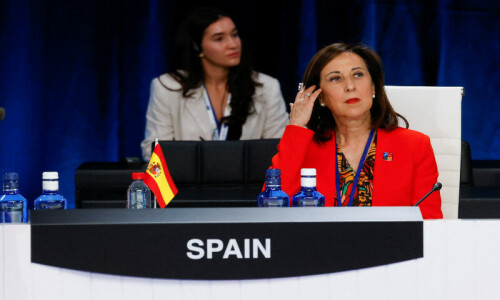LONDON, Feb 6: The Group of Seven wealthy nations pledged to increase Third World debt relief on Saturday but a deal struck after major disagreements fell short of proposals floated by British finance minister Gordon Brown.
"We are willing to provide as much as 100 per cent debt relief on all multi-lateral debt for individual HIPC countries," Brown told a news conference, referring to dozens of Highly Indebted Poor Countries, most of them in Africa.
"It is the rich countries hearing the voices of the poor...showing that no injustice can last forever," he said.
Brown, who chaired the G7 talks, had pushed for a complete write-off of African debt and a doubling of aid to $100 billion a year but the latter proposal ran into US opposition and there was no agreement on it.
Sub-Saharan Africa owes around $70 billion to multilateral lenders such as the World Bank and International Monetary Fund and Brown said these public agencies would now have to come up with plans on how to deliver on the debt relief pledge.
Washington had also objected to his proposal to use IMF gold reserves to fund the debt write-off and to a new financing mechanism that would double aid. A G7 communique said the IMF would produce ideas on this front by April.
G7 nations are under intense pressure to deliver on promises to rid Africa of poverty by 2015, the so-called Millennium Development Goals.
"We will make particular efforts in the case of Africa, which on current rates of progress will not meet any of the Millennium Development Goals by 2015," the communique said.
Brown had wanted approval for his International Finance Facility (IFF) scheme to double aid to Africa to $100 billion a year but got no US backing and others were cautious too.
The compromise deal followed an emotional appeal from South Africa's Nelson Mandela in London, where he equated the fight against poverty to the struggle against apartheid.
"Do not delay while poor people continue to suffer," the 86-year-old former political prisoner said, demanding a full debt write-off and $50 billion extra a year as Brown proposed.
US Treasury Under Secretary John Taylor said he disagreed with the Brown plan, under which rich countries would provide guarantees to raise money in the capital markets, and use gold reserves to fund a debt write-off.
In the wake of the US opposition, Italy and Germany pushed for something less ambitious but backed the principle. The G7 comprises the United States, Japan, Germany, Britain, France, Italy and Canada.
OTHER ISSUES: The bulk of the meeting was devoted to the Third World but the ministers also discussed ways of reducing volatility in the oil market after prices hit record highs last October.
They also discussed currency management and economic risks and did not stray from a year-old policy statement which called for less volatile currency markets and greater exchange rate flexibility.
The latter point is aimed mainly at China, which sent its finance minister and central bank officials to meet G7 members.-Reuters














































Dear visitor, the comments section is undergoing an overhaul and will return soon.